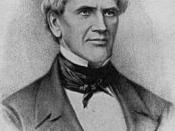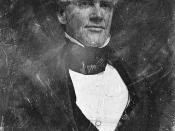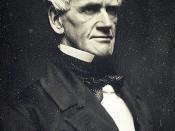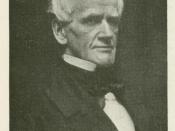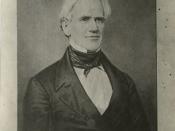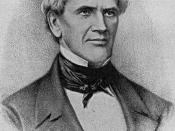As a rationale for his support of public education, Horace Mann, as the Secretary of the Mass. State Board of Education, wrote his 12th Annual Report. This report was based upon his own theories and ideas of education. A few of the theories that Mann touched upon were: opportunity and what it had to offer to the often non-educated, the worth of learning how to use knowledge and how the values of society can affect education. In order to portray these theories to main stream society, Mann used the example of Common Schools. He believed that Common Schools not only allowed his theories to install the principles education had to offer to the masses, but that it also showed them how to go about putting those principles to use. He believed his theories to be true and extremely informant to those who were educationally left behind. He understood that society could improve as a result of public education and that, public-education, would set things straight for our nation for years to come.
Horace Mann's primary goal for education was to provide a more equal opportunity to the mass of the uneducated. To Mann, opportunity meant being able to go out and get an education, something many had trouble simply getting started doing. Mann's other goal for education was to let people know of what opportunities education had for them. Education did not open any doors of opportunity, yet it created doors for the people to choose to open themselves. This led to people of the "uneducated" society having an opportunity, if needed, to get out of problems such as poverty. The term "uneducated" refers to those who couldn't afford to send their children to private schools. This could have been based on the amount of tuition and/or the possible income the family would lose from their child if he/she went to school. It was definitely a hard decision for most parents. By sending their child to school, parents were faced with one of two outcomes, that the child would succeed and get a great job or that he/she wouldn't succeed and that the family would have to deal with the loss in income the child could've brought to the "table" while not being in school. Mann stated; "But education creates or develops new treasures; --treasures not before possessed or dreamed of by any oneâ¦." (12th Annual Report, page 6).
What Mann was getting across with this was that the "uneducated" finally had the doors in front of them and that it was up to them to open those doors or turn their backs and follow the set value of society that they were used to. Mann was hoping that by this, they would understand that education was "here to stay" and that it was the way out of poverty. Education then, beyond other human ordeals, such as politics, jobs, and the economy, became the greatest way of equalizing the social and economical standards of men. That is, if all went well.
Mann saw the ability to learn how to use gained knowledge as a way of acquiring power. Mann saw an educated person as someone who was in charge of their own future and able to better themselves within their social community. To be educated enabled you to take in what you have learned and use it to benefit yourself and those around you. Learning, in my eyes, was viewed as a way to know which door(s) to open. Mann stated that if "all mankind were well fed, well clothed and well housed, they still might be half civilized." (12th Annual Report, page 2). I believe that the other half to being civilized is being well educated. The ability to read and write, including mathematics and the sciences, would allow a person to achieve what the uneducated couldn't. In other words: To make the impossible seem possible. The possible was that simply being educated enough to know what path you wanted to choose in life. Mann said it best in a speech to the graduating class of Antioch College in 1859; "Be ashamed to die before you have won some battle for humanity." Aka- if what you have learned does not benefit more than yourself, then shame on you. This belief, accepting the improvement of the human race, played a huge role in Mann's efforts to establish a free public education for all.
Horace Mann's last theory was dealing with the values of society. Mann believed that education would increase the poor masses' chances of success in life. Society had the values of equality to offer to those who took advantage of it. Equality was seen in the statement Horace Mann made in his 12th Annual: "According to the European theory, men are divided into classes. According to the Massachusetts theory, all are to have an equal chance for learning and equal security in the employment of what they earn." (12th Annual Report, page 3).
Mann believed that social mobility was the only way to succeed when migrating to America. Social mobility could be achieved by following the Massachusetts theory. This theory seemed to be the way of the land except that there was an abundance of Europeans that chose to come to the Americas. It was hard for society to change their values and feel obligated to help everyone especially in the education sense. However, these obligations became a basis for equality. Education, in the beginning, was not seen as an equal until people like Horace Mann came along and forever had an effect on main stream society. It was equality, as time went by, that set forth the course for an evolution of education and this caused the values of education to not be taken lightly by any means.
All of the above theories were not seen as just ordinary sayings. Eventually people began to believe in Mann and his ideas and theories of education. Education was and still is something we all must work hard for. The "so called" doors were a way to put into plain words the opportunity the public had. If they didn't work hard after getting through those doors, then failure was inevitable. Education, for everyone, is due heavily to the hard work of Horace Mann as well as all other contributors. They strived so "their children" could have a better education than they had when they were younger; a belief that still lives through us all today.
Citations: "The Twelfth Annual Report"- taken from Blackboard- (Course Documents) - pages 1-14 by Horace Mann in 1848 "Giants of American Education: Horace Mann", (Sybil Eakin) Technos Quarterly, Volume 9, No.2, 2000- for some of the theories of Horace Mann
